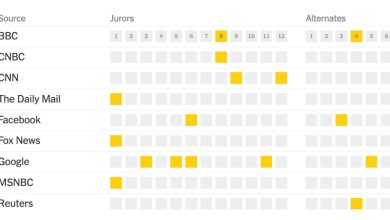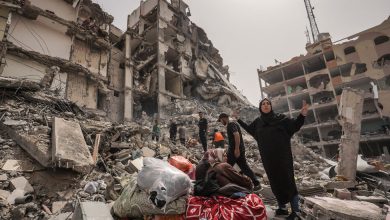With cases still rising in Hong Kong, 300,000 people are isolating at home, officials say.

HONG KONG — As many as 300,000 Hong Kong residents are isolating at home, the city’s leader said on Sunday, as officials scrambled to build mass quarantine centers and treatment facilities to house patients with even the mildest Covid-19 symptoms.
Until recently, Hong Kong routinely sent the close contacts of confirmed Covid cases to government-run quarantine camps. But as the Delta and Omicron variants spread widely, and as hospitals strained to accommodate nearly 700,000 reported cases this year in a city of 7.4 million, the government was forced to adjust its strict policies. Hong Kong is averaging 24,242 new cases per day, according to the Center for Systems Science and Engineering at Johns Hopkins University.
People with close exposure to the infected are now allowed to quarantine at home, provided that they do not share kitchens or restrooms with other households. Provisionally, the government has also allowed people who have tested positive for the coronavirus to stay home as they wait to be admitted to quarantine centers or hospitals. And the quarantine period has been shortened to a week for the fully vaccinated.
Once a world leader in keeping the virus at bay, Hong Kong has tried to keep its rules as strict as possible. Previously, close contacts and travelers entering the Chinese territory were required to isolate for 21 days, one of the longest quarantine periods in the world. On Thursday, Hong Kong’s security minister warned that people who test positive on a rapid test can be prosecuted if they refuse government orders to enter a quarantine center. (The government still requires everyone who tests positive, including those with mild or no symptoms, to isolate in hospitals or government-run quarantine centers, unless they are filled to capacity.)
Hong Kong’s chief executive, Carrie Lam, said on Thursday that the government, with the help of a Chinese construction firm, would convert shipping containers into thousands of makeshift cabins for isolation. Public housing and hotel rooms are also being requisitioned to add a total of 70,000 new beds to the city’s quarantine capacity.
This weekend, the government introduced a new hotline to help facilitate the daily needs of those isolating at home who cannot arrange for deliveries of food or basic necessities themselves. A statement encouraged quarantined residents to lean on family, friends and commercial deliveries of food where possible so that the hotline could be reserved for those with “genuine needs.”
This has proven challenging in past weeks, as courier services suspended door-to-door delivery despite unprecedented demand. Supermarkets and drugstores were emptied of groceries and over-the-counter medications as residents grappled with mixed messaging about whether the city would be locked down.
Officials said they had begun distributing care packages to residential homes consisting of traditional Chinese medicine. They will soon add paracetamol and pulse oximeters to these packs, and have been mobilizing volunteers to deliver them to the elderly and those isolated at home, they said.
“I will confess that because of the large number of people who are in this situation, we may not be able to reach out to everyone,” Mrs. Lam, the city’s leader, said at a news conference on Sunday.




